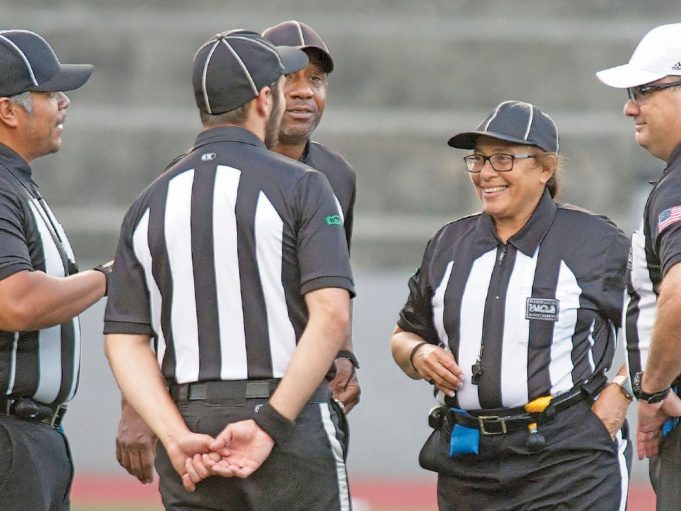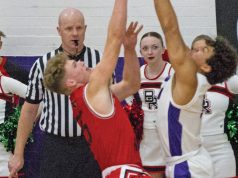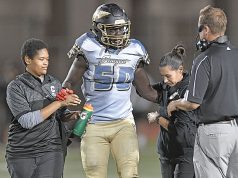When any game assignment arrives, all sorts of questions usually race through an official’s mind. First, who’s playing? Great teams? A rivalry game? If you’re an official for the right reason it really doesn’t matter. They’re all good.
Second, where is it being played? Is it the old crusty gym across town? The loud and raucous stadium? Again, it really doesn’t matter a whole lot.
But one question that does matter to officials is, who are my partners? The answer can either cause a sigh of relief or a pang of anxiety. The names might conjure memories of blown calls, inadvertent whistles and petty arguments over who had the better angle to make the call.
It’s best to take a deep breath and remember two key words: crew harmony. Those two words speak volumes as you strive to be successful every game, season after season. It’s no different than the harmony that’s essential in a marriage, a family unit, a work environment or a social organization. No man or woman is an island. No official can be one either. Officiating is a people business and people must be in harmony to achieve common goals.
A crew is only as good as the crew itself. If one crewmember doesn’t perform as well as his or her crewmates, the game will be evaluated as not being well officiated. Crewmembers must be on the same page in order for the crew, and thus each individual, to be successful.
So how do you do it, especially on nights when it seems your crew is not in the same book, let alone on the same page?
Mutual respect as officials and more importantly, as human beings, is the first necessary ingredient. Support, communication and humor are other keys.
While all crewmembers must know their responsibilities to the crew and to each other, it is the crew chief in football who must take the initiative in building harmony. In basketball and soccer it’s the referee, in baseball and softball it’s the umpire-in-chief, and in volleyball the first referee.
In all sports it is usually the veteran. It is every veteran’s responsibility to help younger crewmembers without a condescending attitude. It is the crew chief’s responsibility to create the “family” atmosphere that is crucial to crew harmony.
That family atmosphere may be more easily built and maintained in football and baseball, in which set crews are common. In other sports, referees often work consecutive nights with different partners, all season long. It is extremely important to build harmony, if just for a day.
The process begins with a phone call when the games are first assigned. It may be an icebreaking introduction, a friendly reunion of paths crossing or a straightforward discussion about the game and the travel plans. If possible, traveling to a game together, be it in a car across town or on a plane across country, is a good way to begin establishing harmony.
The pregame conference is then the main forum for building the harmony that will carry the crew throughout the game. It’s the crew leader’s responsibility to make each person feel comfortable in the pregame. None of the officials should feel intimidated or overwhelmed or in the shadow of another official. If they do, they’ll be hesitant and not make the calls that need to be made. The whole idea is to elevate a new or less-experienced official, to bring him or her up to a higher level so that the whole crew works at a higher level.
One way to do that is to have the new or less-experienced crewmember begin conducting the pregame. The more you let that official participate and throw out ideas, the more comfortable he or she will feel. With a more veteran crew, egos must be put aside for the good of the unit.
When the game begins, the process of building crew harmony continues. No raised eyebrows, negative body language or outward criticism can be tolerated if the crew is to work productively as a team, and thereby earn the respect of the players, coaches and fans.
Don’t ever embarrass a crewmember and imply that you don’t agree with his or her judgment. And keep a sense of humor at all times, without affecting the flow of the game.
And what happens when it just doesn’t work? What happens when there is friction between partners or dissension among crewmembers?
The crew chief should file a report with the assigner or coordinator with an honest assessment of why it didn’t work. It’s up to the person in charge to see if there is a pattern with a particular official. Then there are further evaluations and rating systems to help deal with individual problems that can disrupt a crew.
And then move on to the next assignment, with the next partner or set of crewmembers, and with a total commitment to getting it right — together.
What's Your Call? Leave a Comment:
Note: This article is archival in nature. Rules, interpretations, mechanics, philosophies and other information may or may not be correct for the current year.
This article is the copyright of ©Referee Enterprises, Inc., and may not be republished in whole or in part online, in print or in any capacity without expressed written permission from Referee. The article is made available for educational use by individuals.
















